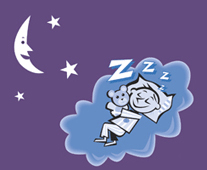Sleep Disorders in Teens
Teenagers lead busy, stressful lives. Sleep disorders that affect their ability to get a healthy night’s sleep can have long-lasting effects, causing irritability, fatigue, and difficulty concentrating on schoolwork. Identifying and treating a sleep problem can drastically improve your teen’s health and enjoyment of everyday life. Causes include:
Sleep Apnea
Obstructive sleep apnea (OSA) is characterized by periodic blockage of the airway during sleep. In an individual with obstructive sleep apnea, the soft tissues at the back of the throat collapse during sleep.
This cuts off airflow, causing the brain to wake the body to restore normal breathing. Waking episodes can occur hundreds of times each night, resulting in poor sleep quality. OSA can also cause loud, disruptive snoring.
Restless Legs Syndrome
Restless legs syndrome causes uncomfortable burning or crawling sensations in the legs. These sensations worsen when the legs are still, and often prompt an intense urge to move the legs for relief.
This condition has also been connected to jerking leg movements during sleep, which can disrupt the sleeper.
Insomnia
Insomnia causes trouble falling or staying asleep, resulting in long hours spent awake and inadequate sleep during the night. This sleep disorder may be caused by a number of factors.
Mild or acute insomnia is transient, and often occurs in times of stress and lessens once the stress is gone. Chronic insomnia lasting longer than a month may be a sign of another underlying medical condition and should be evaluated by a physician.
GERD
GERD, or gastroesophageal reflux disease, causes a malfunction of the muscle valve that prevents backflow of stomach acids into the esophagus.
This condition can be exacerbated by lying prone, and can affect sleep when the esophagus becomes irritated and inflamed.
Consequences of Teen Sleep Disorders
Mood
Teenagers are particularly vulnerable to sleep troubles caused by their changing bodies and challenging schedules.
Too little sleep has far-reaching effects on both the body and mind, lowering more than just your teen’s physical and academic performance.
Sleep deprivation often causes negative feelings and moods including irritability, frustration, anxiety, and depression.
These feelings often arise from the mental and cognitive difficulties that accompany too little sleep, which result in lower grades, increased difficulty concentrating on and remember information, and a lack of energy.
Chronic sleep deprivation can lead to mood disorders such as depression, and may even increase your teen’s risk of substance abuse and suicide.
If your teen is showing signs of trouble sleeping or has spoken to you about such problems, contact a sleep specialist to begin treatment that can improve your teen’s mood and health.
Sleep Texting
Today, teenagers are constantly using devices such as computers, tablets, and phones.
Bringing a phone into the bedroom or falling asleep with a phone in hand represents a significant problem for many teens.
When partly awakened from sleep, teens can perform activities such as texting without remembering doing so in the morning. Sleep texting can disrupt normal sleeping patterns, causing daytime drowsiness and other health ramifications.
Separating your teen’s device usage and sleep is essential for maintaining healthy sleeping habits.
At Zeeba Sleep Center, we offer treatment for sleep apnea, insomnia, restless legs syndrome, and more in Las Vegas.
We are one of the area’s only accredited sleep disorder facilities, so call us today at (702) 242-1562.
Help your teen live a healthier life by learning more about sleep and sleep disorders when you click through the information on our website.
Zeeba Sleep Ceneter is accredited by the American Academy of Sleep Medicine and has board-certified sleep physicians providing comprehensive sleep diagnostic and treatment services.
American Academy of Sleep Medicine
3425 Cliff Shadows Pkwy, Las Vegas, NV 89129
Call Us Today (702) 242-1562
Copyright © 2025 Zeeba Sleep Center All rights reserved.
